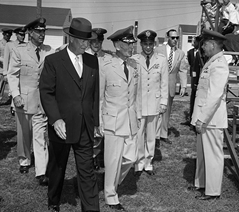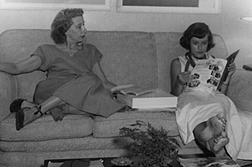 | ||
| Donald Zimmerman was the brother of my grandmother, Erma Zimmerman Smythe. I had the opportunity to meet him only once. He was a guest at my wedding in 1974 and I remember him as being very nice and funny. He joked how he and his wife couldn't really prove they were married since they lost their marriage certificate and the records from where they were married burned down. My father, however, had many fond memories of his uncle Don. My cousin was kind enough to loan me the June 2, 1955 issue of the Saturday Evening Post which contained this rather lengthy and detailed article about General Zimmerman. Here are excerpts from that article written by Jack Alexander to which I've added some family pictures. | ||
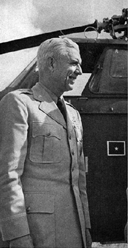
This month 300 young Americans will become the first cadets of the U.S. Air Force Academy. Here's an intimate portrait of the general who will take them in hand.BARRING sudden national catastrophe, a fifty-one-year-old brigadier general named Don Zabriskie Zimmerman will in one way or another have a good deal to say about the future of the United States Air Force. As dean of the faculty of the Air Force Academy, which receives its first class of cadets on July eleventh, Zimmerman is responsible not only for selecting the teaching staff but also for maintaining the shape and intent of the curriculum. It is an unusual kind of curriculum as such things go in formal military education. As many classroom hours are assigned to the humanities and social studies as to scientific subjects, and as many to English as to mathematics.
General . . . Zimmerman, who is soft-spoken and enormously self-confident, is fond of complicated problems and he works around them the way the Sioux worked around Custer, before closing in for the kill. He has a service reputation of being that rarity in the military known as an independent thinker, and is widely recognized as a superior co-ordinator and planner. When asked a question, he never gives a partial or off-the-cuff response. Instead, he muses for a few seconds and then delivers a reply that neatly packages the subject and its immediate implications. His mind seems always to work in a pattern of unity and to abhor the fragmentary. He has a kind of slow brilliance and is painstakingly thorough. He also has an unearthly talent for relaxing, and he laughs easily and often. A gregarious man, with a great love of intellectual discussion, Zimmerman will sit up most of the night to talk things over if anyone else is as willing and hardy as he is; and next day he will be the only one who looks fully fit. Loss of sleep doesn't affect his smooth functioning, nor does the skipping of a meal or two. If he happens to be working out a problem or to be engaged in an interesting conversation, he forgets about eating. Not long ago a junior officer from the Pentagon called upon Zimmerman to seek his advice about suitable topics for an Air Force house publication. The general's schedule happened to be flexible that day and he was at his discussive best. The session began around 9:30 in the morning. Noon came and went and the general was still fishing up ideas and elaborating upon their usefulness. Around 3:30 in the afternoon the Pentagon lad broke in apologetically to remark that he hadn't eaten since an early breakfast, and he mentioned other necessities which were pressing him. Zimmerman glanced guiltily at his watch and laughed. "Sorry to have kept you so long," he said paternally. "It's just down the corridor on the right-hand side." The general has two learned hobbies, meteorology and geology, and neither is ever far from his mind. In a short walk out-of-doors he will cock an eye aloft and comment learnedly on the cloud formations and the wind's direction and whatever else forecasters base their predictions upon, and will hazard an informed guess as to the next day's weather. Or he will pick up pieces of rock, examine them expertly and discourse with enthusiasm on their ancestries and life experiences. "Don loves everything that God ever made," the wife of a fellow officer says, "the mountains, the clouds, the stars, the weather and every little old rock on land or under the sea."
Though it was evident from his early schooling that Don Zimmerman was a scholar of promise, it wasn't until he had left the home-town academic groves far behind that he showed convincing signs of becoming an independent thinker. His family background is a typically American compound of diverse racial strains. His father, John Wilbur Zimmerman, was the son of a Pennsylvania-German father and a Scotch-Irish mother. When the elder Zimmerman, a quiet, dignified man, made the acquaintance of his future bride, he was a traveling auditor for a lumber company. Thriftily, he added to his income, as he went from town to town, by giving demonstrations in public schools of an ornately curlicued style of penmanship which was considered elegant at the time. His calligraphy was exquisite and he embellished it with doves in flight and similar lovely concepts. He also made some money by dabbling in real estate.
Later on, when her children were to ask about her romance, she was to explain jocularly that she had always wanted to add a fourth Z to her initials and that the providential appearance in McLouth of John Zimmerman was too good an opportunity to pass up. Actually, they had met at a party and had fallen in love forthwith. Her father, who was a Methodist minister, did have a fey interest in bizarre initials, though. After his daughter had been irrevocably baptized, he solemnly voiced a guilty fear that he had condemned her to spinsterhood, as she wouldn't want to break the chain of Z's, and eligible young males with surnames beginning with Z were not plentiful. The Reverend Zabriskie had a droll sense of humor and it was difficult at times to tell whether he was being serious or waggish. If he was serious in this instance--which he very likely wasn't-he was the first of many persons to underrate Zilpha's resourcefulness. Subsequent Zabriskie children were spared the imposition of queer initials, except for one who was saddled with W. X. Y. Z. --for Walter Xerxes Yansi Zabriskie. According to some members of the family, this was the Reverend Zabriskie's way of serving notice, by use of the four terminal letters of the alphabet, that there would be no further additions to the household. This explanation is disputed by others in the family, who point out that Zilpha's three Z's had a more final ring to them. Whichever side is right, Waiter did prove to be the Zabriskies' last child. In his mature years Walter ran a general store at Pagosa Junction, Colorado. His customers were the neighboring Ute Indians. Among other things, Walter Zabriskie was a gifted mechanical tinkerer and a man of strong opinions. He had a special contempt for the piston engine, which he held--correctly--to be inefficient. His own inventive answer to it was the designing of an engine made up entirely of rotating parts, with no energy dissipated on the starting and stopping of pistons. A true individualist, Walter Zabriskie was, in a way, ahead of his time; the principle of his engine is used today in certain types of compressors. In another way, he was on the wrong road; his principle, for use in power plants, has been outmoded by the gas turbine.
Don's mother had great hopes for him as a student and tried to steer him into the study of medicine. He fulfilled her hopes on the first count, entering the university at fifteen. But he balked at studying medicine. His major in freshman year was mathematics, but he changed it in his sophomore year to geology. He did this after having had long and interesting discussions with Donald deCou Smythe, a geologist who had married one of the Zimmerman girls. Another interloping influence was baseball. During Don's senior year, when he was team captain and left fielder, minor-league scouts and a couple from the majors dropped in at Eugene to size him up. Zimmerman, when in action, delighted the experienced eye. Through excellent timing he had a way of making hard catches look easy. It was the way Red Grange had of seeming to be merely coasting in picking up thirty or forty yards on a routine off-tackle play. Zimmerman's batting average was unspectacular, but he hit a long ball and was almost infallible as a clutch hitter. His calm demeanor had a noticeably steadying effect on his teammates. Here, plainly, was a youngster who had been endowed with an invulnerable nervous system. A geneticist, had there been one on the side lines, might have recognized this endowment as a bonus which Nature occasionally bestows upon a product of random breeding -- genetically speaking, the way human beings breed -- gloriously, for love, and without consulting the Mendelian tables of heredity. The scouts sensed the presence of this quality as a cat senses the presence of a mouse.
"How did you know he was a baseball man?" asked her son. "He just looked like one," she said gloomily. Though she lost her war in behalf of medicine, Mrs. Zimmerman had the satisfaction of seeing organized baseball lose out too. Her son had bids from two major league and two Coast League clubs. One of the latter proffered a contract for the next season at $400 a month. Don asked his baseball coach for advice. The coach was disillusioning. He pointed out that contracts could be tricky, and said that after spring training a clause in the small print might be invoked to reduce his salary to $100. Besides, he said, very few promising recruits ever made high salaries even after moving up to the big leagues. Reluctantly, Zimmerman turned down the offer and never again considered professional baseball. "It was really a hard decision to make," he remarked recently, during a spell of reminiscence. "I liked baseball and I wanted to play in the majors and make a lot of money." The earning of money was an old story to Don Zimmerman. He had begun working for wages at the age of twelve--as a fruit and vegetable harvest worker and as janitor and stock clerk in a ten-cent store. Except for his board and room, which he got at home, he paid all of the expenses of his university education. His revenue came from vacation and weekend jobs. After getting his bachelor of science degree, Zimmerman began working for a master's degree in the same field. In his fifth and sixth years at the university he was a graduate assistant in geology at a salary of $500 a year. At this point he had become a campus celebrity. He had shown that he had strong leadership talents. He had been elected to the student governing body in his senior year and had been captain of the baseball team. He had been tapped for professional and honor societies. His scholastic attainments had won him a campus nickname, The Brain. In the spring of his sixth year he received a number of teaching offers. There was also an offer of a commission in the Regular Army--as an undergraduate Zimmerman had been an honor ROTC student and cadet colonel commanding the ROTC regiment. Zimmerman turned them all down and made a choice by which, unwittingly, he ticketed himself for a military career anyway. His strongest ambition at the time was to become a petrographer, a specialist in identifying and classifying rocks. Meanwhile, news of his campus fame had reached the ear of United States Sen. Robert Nelson Stanfield, who had a spare West Point nomination to confer. He offered it to Zimmerman as the young man most likely to add luster to the fair name of Oregon. Zimmerman went, for fatherly advice; to a Regular Army captain attached to the university's ROTC. The captain, well aware of Zimmerman's love of sports, gave a glowing account of the West Point athletic program. Inadvertently or not, he also left an impression--surely one of the most inaccurate white lies ever implied -- that a cadet's life allowed plenty of time for leisure reading, an indoor sport which Zimmerman found both restful and instructive. Zimmerman had the senator's offer under advisement, and was none too happy about it, when he was informed that a graduate scholarship in petrography at an Eastern university, upon which he had set his heart, had somehow failed to come through. That did it. Losing no time, he accepted Stanfield's appointment, resigning his infantry reserve commission and leaving his master's studies dangling. At that, the Zimmerman who entered West Point in 1925 was probably one of the best-educated plebes in the academy's history.
His interests covered a wide range. He sang in the cadet choir and taught Sunday school, and he qualified as an expert in rifle and pistol marksmanship. He was a color corporal and a company commander, and he wore on his uniform the stars of a "distinguished cadet," which were awarded to those whose average grade exceeded ninety- two. As he had been at the University of Oregon, Zimmerman was, in the colloquial phrase, a big man on the campus. He was class president three times, and was thus the only president his class ever had--the lowly plebes, considered in West Point tradition to be less than human, are not allowed to have a president. Of the 299 members of the 1929 graduating class Zimmerman ranked sixth. By Army practice the top-ranking members of a graduating class--unless they elected otherwise--were commissioned second lieutenants in the elite Corps of Engineers. Zimmerman was so commissioned, but, as things turned out, he never served in that branch. Once more, unplanned influences had diverted the course of his career. His class' senior-year trip had included a visit to Langley Field, Virginia. Cadet Zimmerman had liked the unquenchable Air Corps spirit he encountered at Langley and he had liked the adjutant, Col. James F. Doherty, who had long been one of the voices crying in the Army wilderness for an independent land-based air arm with a budget all its own. Zimmerman had also liked Marion Doherty, one of the adjutant's daughters, who had her own kind of eloquence and whom he was marry later on. The trip had fired Cadet Zimmerman with an enthusiasm for flying and, on receiving his commission in the Engineers, he asked for flying-training duties with the Air Corps. During his graduation leave Zimmerman paid what looked like an unorthodox visit to former Brig. Gen. William (Billy) Mitchell at his farm in Virginia. Mitchell had been court-martialed for making heated attacks on the probity of the Army General Staff, and was allowed to resign. Actually, Zimmerman had not intended to be unorthodox. He and Mitchell belonged to the same college fraternity, Phi Kappa Psi, and Zimmerman wanted only to pay his fraternal respects. The fraternal amenities were quickly over with, and for several hours the second lieutenant listened while the most impassioned apostle of autonomy for Army air and of unconventional military thinking explained his doctrines. Though impressed by the words of Mitchell, as he had been with those of Colonel Doherty, Zimmerman was not yet convinced that the thinking of radical thoughts was compatible with military discipline. He stopped off at the University of Oregon long enough to take an examination and pluck the master's degree in geology, which he had left dangling four years earlier, then headed for March Field, California, for his primary flying training. He took advanced training at Kelly Field, Texas, and won his pilot's wings, whereupon he was transferred from the Engineers to the Air Corps. It was in the early '30's, when Zimmerman was stationed at Luke Field, Hawaii, before he decided that unconventional thinking had its rightful place in his profession. The decision came in an extremely painful way. One afternoon, having nothing else to do, Zimmerman and a few other eager-lieutenants set out to practice the then-burgeoning art of steep dive-bombing, using bomb casings filled with sand. Their flying equipment was the Thomas-Morse 0-19, a biplane powered by a Wasp engine. The ship was designed for observation, but it was rigged, primitively, for bombing. Its bomb-release handle lay deep at the right side of the pilot's seat. To pull it, the pilot had to transfer his left hand from the throttle to the stick and reach down to the floor with his right hand - an awkward move when diving at high speed. Zimmerman's companions in adventure took the precaution of tying one end of a rope to their rings and letting the other end, heavily knotted, lie across their laps, where it could be yanked with a minimum expenditure of time. Zimmerman didn't install a rope, reasoning that the manufacturer knew his product best and, had he thought it necessary, would have made the rope a part of the plane's standard equipment. The others in the practice flight made their drops and pullouts smoothly; then Zimmerman peeled off and dived for the target. At the scheduled drop point he took the stick with his throttle hand and bent over-thereby limiting his forward vision - to grasp the bomb-release handle with his right hand. He gave it a yank. It stuck. He yanked at it again. It stuck again. With the uprushing earth now too close for a pull- out, Zimmerman horsed back on the stick and pancaked with a terrific thump. The wheels tore loose and the rest of the landing gear flew forward several hundred yards. During a mighty bounce the plane itself made three complete rolls and finished right side up with the upper wings drooping on the lower ones. Luckily for the pilot, the 0-19 was one of the first military planes to be made with a metal monocoque fuselage -- that is, a shell-like tube without braces or spars. When a rescue squad reached the wreck the pilot was just crawling out of the twisted but protective metal cocoon. At the hospital the only discernible injury, aside from a wealth of cuts and bruises, was a fractured leg. Another injury came to light when Zimmerman, while his leg was mending, discovered that he had lost his ability to yell. A doctor inserted a tongue depressor and peered down his throat. "Your vocal cords," he said, "are as slack as the strings of a busted violin." Further examination showed that the crash landing had stretched Zimmerman's neck a fraction of an inch. It was this injury that made his voice permanently husky. He has never since been able to emit a good yell--a liability that, happily, inconveniences him only at football games. As a result of the crackup or by an unlikely coincidence, Zimmerman's brown hair began losing its color and within a year or so had turned white. In emerging from his metal cocoon Zimmerman emerged also from his cocoon of conventionality. In the mid- '30's, while stationed at Crissy Field, San Francisco, he enrolled at the California Institute of Technology for a graduate course in meteorology, and it looked as if he were merely off on a degree hunt again. But, by good luck, he had as a teacher Dr. Sverre Petterssen, one of a group of Norwegian meteorologists who had developed the polar-front theory of atmospheric circulation and had revolutionized the science of weather forecasting. The revolution was virtually a secret in the United States, only Caltech and the Massachusetts Institute of Technology having recognized it up to then. Zimmerman fell in enthusiastically with the revolution and got a chance to advance it when, after winning his second master's, he was assigned to a four-year tour of duty at Randolph Field as post weather officer and instructor in meteorology. Finding the existing text-books hopelessly out of date, be brushed them aside and, without benefit of text, taught the Norwegian system. The transcripts of his lectures were gathered into a book, Weather Manual For Pilots, which the War Department issued as the new standard text. Though Zimmerman was referred to by some of his fellow officers as an "academic woolhead,"he enjoyed at the command level a growing reputation as a bold and practical scholar. Younger officers feared his excursions into unorthodoxy; command officers were glad to have him on their staffs as a planner and trouble shooter. Late in 1940 a report reached the Army Air Corps headquarters that Hitler's panzer divisions had been able to overrun Poland because his weather soothsayer had correctly predicted a month of unseasonable dryness. Gen. H. H. (Hap) Amold had Zimmerman detached from West Point, where he was enjoying life as a mathematics instructor, and sent him back to Caltech to learn whether that kind of predicting was possible. After studying long-range forecasting for a few months, Zimmerman reported that it wasn't, with any degree of accuracy. It isn't, even today. A chance to challenge one of Charles Darwin's less-publicized evolutionary theories was a highlight of Zimmerman's experiences in World War II. After first having served in Washington as the USAAF's director of weather and having trained light-bombardment groups in Florida, Zimmerman, in the latter part of 1943, was assigned to the Pacific. He was by this time a colonel and his new job was chief of the Joint Planning Staff of the 5th Amphibious Force. His first task was to plan for the invasion of the Marshall Islands by the capture of the Kwajalein and Eniwetok atolls. As a geologist, Colonel Zimmerman suspected that Darwin's theory of the evolution of atolls, published in 1842 and still widely accepted, was wrong. Studying research material from the Bishop Museum in Honolulu and hundreds of aerial-reconnaissance photographs of Kwajalein and other atolls, Zimmerman came up with a learned paper on the life cycle of atolls, in which he classified them as young, mature and old. It sounded high-domed, but it turned out to be useful in the Kwajalein operation. Zimmerman gambled by designating Kwajalein as an old atoll and planning accordingly. The Darwinian and Zimmermanian theories are too recondite to explain in popular terms. About all that can be said of them is that the test of the theories lays in the perimeter islands' degree of underwater slope on their lagoonward sides. If the slope was near enough to the vertical, and if the lagoon proved. to be deep enough for the LST's to nose in close and discharge their tanks directly ashore from the lagoon, Darwin was wrong and Zimmerman right. Zimmerman went ashore with the 4th Marine Division when it assaulted and captured Roi-Namur island in Kwajalein atoll, and felt a glow of satisfaction on seeing the tanks trudge ashore from the LST's' ramps without getting their feet wet. After taking part in the planning for the invasion of the Carolines and the Marianas, Colonel Zimmerman was recalled to Washington for duty in the War Department General Staff. Following the surrender of Germany he got back to the Pacific, where he was assistant chief, and later acting chief, of the Plans Division of the Strategic Air Forces stationed on Guam. He was still serving in this command when the atomic bombs were dropped on Japan and the war ended.
What was perhaps the most unusual duty Zimmerman ever pulled came to him in the interval between the two wars. In 1947 Gen. Dwight Eisenhower, then Army Chief of Staff, picked three colonels with established records as independent thinkers, for a body called the Advanced Study Group. The group was charged with the free-wheeling task of radically rethinking Army doctrines which had been built up over the years and turning up suggestions for the warfare of the future. Zimmerman was chairman. The others were Col. George W. Beeler, who had ranked second in the West Point graduation class of 1933, and Col. George Madison Jones, a paratrooper with a brilliant combat record and a Distinguished Service Cross. The group had entree into the highest scientific and military circles in the country and went and talked to any other authorities it pleased. About all that security allows to be told about the reports is that they had a profound effect on military methods and thinking which have grown up since then. (It is now the Joint Advanced Study Committee of the Joint Chiefs of Staff, with representatives from all three of the armed services. The security lid covers not only their work but their identity as long as they are members.)
The Zimmermans have three children--two teen-age sons and a daughter, Donna. Donna is the wife of an Air Force Reserve officer. Mrs. Zimmerman's two sisters are married to Regular Air Force officers. All in all, the Dohertys and the Zimmermans add up to what must be one of the leading clans of the United States Air Force. THE END |
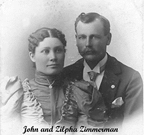 In the summer of 1896 his accounting duties chanced to take him to McLouth, Kansas. By another helpful twist of fate, his visit coincided with the return to McLouth of a local belle who had just been graduated from a state teachers' college. She was a lively young woman of Dutch, Scotch and Polish descent, and she bore the improbable name of Zilpha Zula Zabriskie.
In the summer of 1896 his accounting duties chanced to take him to McLouth, Kansas. By another helpful twist of fate, his visit coincided with the return to McLouth of a local belle who had just been graduated from a state teachers' college. She was a lively young woman of Dutch, Scotch and Polish descent, and she bore the improbable name of Zilpha Zula Zabriskie.
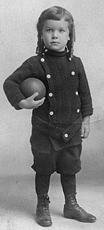 Zilpha became Mrs. John Wilbur Zimmerman before she got a chance to use her teacher's certificate. However, she retained a passion for education that was almost fanatic. As children began to appear she wheedled her husband into giving up the traveling life and locating the family in some good university town. This was easily done. The home office of the lumber company was in Eugene, Oregon, the seat of the state university, and John Zimmerman became the company's resident comptroller. All four of the Zimmermans' children, of whom Don was the youngest and the only boy, got at least one university degree.
Zilpha became Mrs. John Wilbur Zimmerman before she got a chance to use her teacher's certificate. However, she retained a passion for education that was almost fanatic. As children began to appear she wheedled her husband into giving up the traveling life and locating the family in some good university town. This was easily done. The home office of the lumber company was in Eugene, Oregon, the seat of the state university, and John Zimmerman became the company's resident comptroller. All four of the Zimmermans' children, of whom Don was the youngest and the only boy, got at least one university degree.
 Zilpha Zimmerman, in her ordeal over her son's future, developed an extra sense of her own. One day, after seeing him chatting with a stranger, she asked him, "Which baseball man was that? "
Zilpha Zimmerman, in her ordeal over her son's future, developed an extra sense of her own. One day, after seeing him chatting with a stranger, she asked him, "Which baseball man was that? "
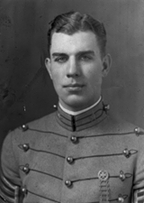 At West Point, Zimmerman soon learned that his ROTC adviser's yarn about leisure time was pure moonshine. From reveille to taps there was scarcely a loose minute in a cadet's schedule. But the West Point athletic program lived up to its billing; For a versatile performer it was a bonanza, and Zimmerman took full advantage of it. He played four years on the basketball and baseball teams, captaining the latter in his last year, and for two years was a substitute fullback on the football team.
At West Point, Zimmerman soon learned that his ROTC adviser's yarn about leisure time was pure moonshine. From reveille to taps there was scarcely a loose minute in a cadet's schedule. But the West Point athletic program lived up to its billing; For a versatile performer it was a bonanza, and Zimmerman took full advantage of it. He played four years on the basketball and baseball teams, captaining the latter in his last year, and for two years was a substitute fullback on the football team.
